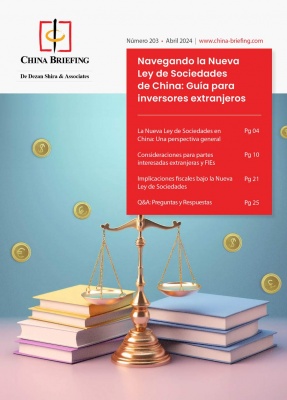Mandarin Language Not Essential For China Success
Op-Ed Commentary: Chris Devonshire-Ellis
Aug. 15 – One of the interesting debates amongst many China expats, particularly those just starting out on their careers, is the need to have fluency in Chinese. Those that have obtained such a status tend to see themselves as superior to those that do not, which given the circumstances, appears reasonable. However, having lived in China for over 20 years, I do not believe that having such linguistic skills is a mandatory requirement for success. It’s an advantage certainly, but not an essential qualification.
Fluency in Mandarin in any event is a fallacy – it doesn’t exist. China is so large and diverse a country that regional dialects make the common understanding of Mandarin virtually impossible. Take my country for example, the United Kingdom. With a total area of 242,900 square kilometers, we have a diverse array of accents, with Glaswegian being almost impossible to decipher for those without regular exposure to it. China on the other hand has a land mass of some 9.6 million square kilometers – one can only imagine the level of dialects and different languages that exist nationally. It’s an issue that is identified in the usage of the Chinese currency itself – seven languages exist on a Chinese 人民币banknote.
To hammer home the point, years ago I lived in Shenzhen, just across from Hong Kong. In those days it was a boom town, but with a previous incarnation as a fishing village with a population of just 15,000, the “city” was importing Chinese workers and professionals from all over China to build and develop what would become modern China’s first entirely new metropolis. It created a unique situation : almost no-one in Shenzhen actually came from there. Trying to discuss issues, even amongst the Chinese, would mean lots of drawing characters in the air to get around the mutual verbal incomprehension. Sichuanese battled to understand those from Henan. Workers from Harbin, that most precise of Mandarin dialects, struggled to understand the Guangxi. Notes were made on napkins, and hand signals dictated the character being described. If there is fluency in Mandarin in China, it is not verbally communicated; it is written.
The other issue with many expats in China, armed with a newly acquired Chinese language degree, is the degree of arrogance some (not all) portray towards the country and others. An assumption that their new skills almost entitle them to success is misplaced, China is far more subtle than that and has a sensitive approach towards sorting out worthwhile foreigners from the merely communicative. Indeed, in my example, arriving in China with no Mandarin Chinese skills – it may even have been an advantage. Starting from scratch, spending evenings socializing with Chinese friends helping me construct words and sentences with the aid of a Lonely Planet phrase book and plenty of bi-lingual dictionaries forged bonds of slowly developing mutual comprehension between us, almost a wonder of the joys and frustrations of linguistics itself. It is no wonder the Chinese tend to be somewhat suspicious of any new foreigner who immediately strikes up fluency. The Chinese want to see and watch you work at it, not be automatically treated as linguistic equals.
What actually comes out when not being fluent in a language are the more basic levels of communications: and especially a sense of humor, patience and slow progression through intellect. These are all values the Chinese appreciate; being denied the opportunity to assess an individual’s capacity for these leaves many foreigners who are fluent upon arrival a bit of an uphill struggle to really ‘communicate’ their core values. It’s a subtlety lost on many.
There has been much talk of China changing, and that expats need to have fluency, and that those without will be forced to leave as unemployable. There’s some truth in that, but not as much as is commonly perceived. Let me provide an example of a somewhat proud expatriate boasting about his Mandarin fluency in a bar one evening in Shanghai. He was actually attempting to belittle me by correcting mistakes in my Chinese. I became a little frustrated by this after a while and said to him “OK, if you’re so fluent in Chinese, what’s Chinese for “I love you?” He looked startled at such an apparently simple question, and promptly replied “Wo ai ni”. Technically, in Putonghua, that’s correct. But not in the Shanghainese dialect, where the same phrase is pronounced “Wo ai nong”. This particular expatriate had been educated in Mandarin, and was claiming to be fluent, yet in a city whose own indigenous dialect he wasn’t able to recognize. He’d been living there for five years, and Shanghai is not an unimportant place. For foreigners who are fluent and working in China, there is still work to do to gain the trust, and absorb the detailed cultural nuances that can only come from an education in and detailed and long term interaction with the Chinese – and especially if they can teach you something. Foreigners need to find time to allow that education process to occur; without it many will assume an unwanted precociousness and a lack of humility. In short – Mandarin language skills are not enough to ensure success in China. For those without such skills, the acquisition of them requires patience, and you will, if committed, learn far more about China than the mere language. Those that do tend to have long term China careers, and there are reasons for this phenomena: the development and understanding of the Chinese personality and psyche. That doesn’t materialize from fluency alone – but longer term it will be your most valuable asset when seeking a successful career and both engaging with the Chinese, working, playing and even loving them. Both fluent and beginner Mandarin speakers with expat careers in China should take note – success in China is more than just linguistics. There remains plenty of scope for the non-fluent willing to learn and immerse themselves properly in China. It remains the longest lasting route to a successful career.
Chris Devonshire-Ellis is the Founding Partner of Dezan Shira & Associates and the Publisher of China Briefing. He has lived in China for over 20 years and still regards himself as “non-fluent in Mandarin”. Dezan Shira & Associates maintains twelve China offices, employs several hundred lawyers, accountants and tax experts and assists foreign companies establish and maintain their operations in China. Please contact the firm at china@dezshira.com or visit the practice website at www.dezshira.com
Related Reading
 An Introduction to Doing Business in China
An Introduction to Doing Business in China
Asia Briefing, in cooperation with its parent firm Dezan Shira & Associates, has just released this 40-page report introducing everything that a foreign investor should be familiar with when establishing and operating a business in China.
- Previous Article Beijing to Commence VAT Pilot Reform in September
- Next Article Philanthropy In China – It’s Important to Give Back
























